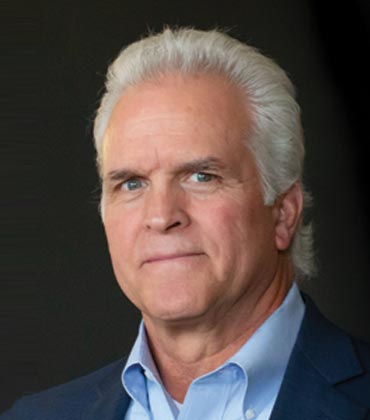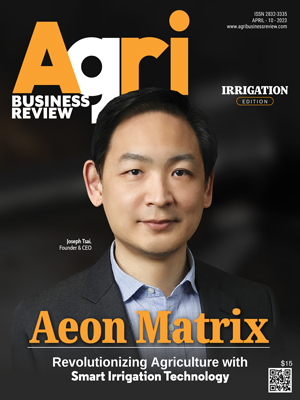Renaissance Ag is a name echoing among livestock producers, with many of them greatly benefiting from its ability to sustainably bolster the feed supply chain. The product partner is automating feed production and facilitating nutrient recycling, empowering livestock farmers to recapture most of the margins that have slipped through their hands over the years.
“Feeding livestock with nutrition-rich fodder benefits dairy products and the quality of meat obtained,” says Scott Raban, VP of business development of Renaissance Ag. The use of water and land needed to grow the feed is also reduced. Farmers can save up to 95% of water compared to traditional methods and can grow a large amount of product in a significantly smaller area.
The current challenge facing humanity is the projected population growth from the current 7.5 billion people to approximately 10 billion by the year 2050, with limited availability of both water and land. As such, it is imperative that we adopt intelligent approaches to sustainably provide food for the growing population. Renaissance Ag utilizes advanced technology to ensure that the animals used in food production are fed in an efficient and sustainable manner. Specifically, their focus is on optimizing water usage in the food production cycle, while minimizing the impact on communities that rely on water for daily activities such as drinking. This represents just one facet of their broader efforts to address these pressing global challenges.
Making this possible is Renaissance Ag’s PastureBox, a self-contained, fully automated system that can produce up to 3,000 pounds of premium quality sprouted fodder for livestock. Its irrigation system provides even coverage of water to each tray. Once finished, the excess water is drained back into the holding tank, where it is filtered and treated before being recycled for the next irrigation period. To be sustainable and raise healthier feed for animals, PastureBox allows users to determine the seed depth, frequency of irrigation, and temperature. It does not use pesticides, herbicides, or fertilizers to produce the fodder, which further optimizes its health and safety.
PastureBox uses a controlled environment to maintain a similar nutritional profile and consistent production. Irrespective of whether there is a windstorm, drought, or snow outside, it keeps the temperature and humidity at an optimal level. The seed has the opportunity to express itself genetically and grow into a healthy and nutritious plant.
Renaissance Ag’s product sits on a footprint of about 10 feet wide and 45 feet long; each PastureBox can replace up to 13 acres of alfalfa. A significant amount of feed can be grown in a small space using a little amount of water. The system uses LED UV lighting to stimulate early growth and provide a healthy green color to the sprouted seed, supercharging the growth process.
A combination of the right technology and tailored growing conditions for seeds ensures the production of consistent and reliable nutrient-rich palatable fodder within six days. Thousands of gallons of water are saved as well as the reduction of fuel and labor costs.
Renaissance Ag’s SiloBox is an excellent value addition for livestock producers and a companion piece to the PastureBox, significantly increasing the seed hopper capacity. The standard solution comes with a flex auger and ultrasonic depth sensor to automatically keep the hopper filled for up to six months.
The two essential pillars of Renaissance Ag are its executive and engineering teams. The executive team’s vision is to make this world a better place by feeding sustainable fodder to farm animals. The engineering team is dedicated to making that vision a reality. Their innovation-driven minds help optimize feed growth and provide sustainable solutions in an economically feasible manner.
As land and water scarcity looms over the next generation, companies like Renaissance Ag are raising the torch of sustainability in the global agricultural industry. It will pave the way for coming generations to make dairy products and meat of high quality in a sustainable manner.
“Feeding livestock with nutrition-rich fodder benefits dairy products and the quality of meat obtained,” says Scott Raban, VP of business development of Renaissance Ag. The use of water and land needed to grow the feed is also reduced. Farmers can save up to 95% of water compared to traditional methods and can grow a large amount of product in a significantly smaller area.
The current challenge facing humanity is the projected population growth from the current 7.5 billion people to approximately 10 billion by the year 2050, with limited availability of both water and land. As such, it is imperative that we adopt intelligent approaches to sustainably provide food for the growing population. Renaissance Ag utilizes advanced technology to ensure that the animals used in food production are fed in an efficient and sustainable manner. Specifically, their focus is on optimizing water usage in the food production cycle, while minimizing the impact on communities that rely on water for daily activities such as drinking. This represents just one facet of their broader efforts to address these pressing global challenges.
Making this possible is Renaissance Ag’s PastureBox, a self-contained, fully automated system that can produce up to 3,000 pounds of premium quality sprouted fodder for livestock. Its irrigation system provides even coverage of water to each tray. Once finished, the excess water is drained back into the holding tank, where it is filtered and treated before being recycled for the next irrigation period. To be sustainable and raise healthier feed for animals, PastureBox allows users to determine the seed depth, frequency of irrigation, and temperature. It does not use pesticides, herbicides, or fertilizers to produce the fodder, which further optimizes its health and safety.
Feeding the livestock with nutrition-rich fodder benefits the dairy products and the quality of meat obtained
Renaissance Ag’s product sits on a footprint of about 10 feet wide and 45 feet long; each PastureBox can replace up to 13 acres of alfalfa. A significant amount of feed can be grown in a small space using a little amount of water. The system uses LED UV lighting to stimulate early growth and provide a healthy green color to the sprouted seed, supercharging the growth process.
A combination of the right technology and tailored growing conditions for seeds ensures the production of consistent and reliable nutrient-rich palatable fodder within six days. Thousands of gallons of water are saved as well as the reduction of fuel and labor costs.
Renaissance Ag’s SiloBox is an excellent value addition for livestock producers and a companion piece to the PastureBox, significantly increasing the seed hopper capacity. The standard solution comes with a flex auger and ultrasonic depth sensor to automatically keep the hopper filled for up to six months.
The two essential pillars of Renaissance Ag are its executive and engineering teams. The executive team’s vision is to make this world a better place by feeding sustainable fodder to farm animals. The engineering team is dedicated to making that vision a reality. Their innovation-driven minds help optimize feed growth and provide sustainable solutions in an economically feasible manner.
As land and water scarcity looms over the next generation, companies like Renaissance Ag are raising the torch of sustainability in the global agricultural industry. It will pave the way for coming generations to make dairy products and meat of high quality in a sustainable manner.
Company : Renaissance Ag
Headquarters :
Vineyard, UT ManagementScott Raban, VP of Business Development
Thank you for Subscribing to Agri Business Review Weekly Brief



